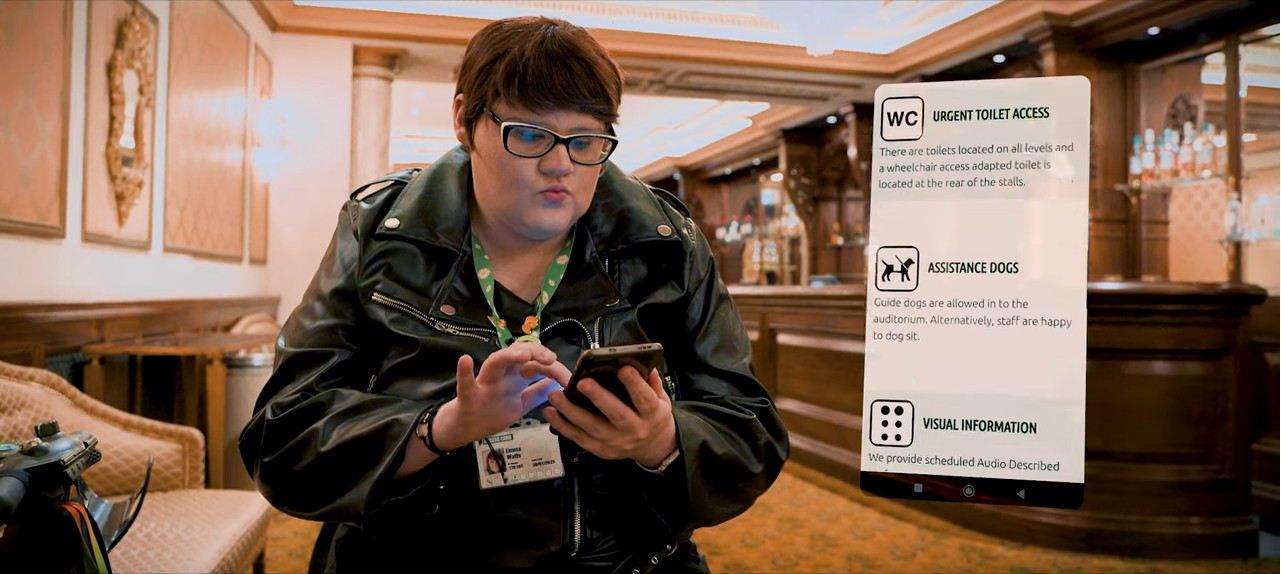
Theatre Goer Becomes Latest Access Card Ambassador
A 34-year-old disabled woman who regularly enjoys trips to West End theatres has been officially recognised as an ambassador for the Access Card scheme.
Emma Watts from Tyne and Weir has ADHD, Fibromyalgia and Chiari Malformation which means she now relies on the use of a motorised scooter and needs to be accompanied when venturing out.
Her passion is going to the theatre with the support of an essential companion and she says that having the Access Card is an important part of her life and independence.
Emma is now the official Access Card Ambassador for theatres and her views and experiences of using the Access Card is now available for others to see online.
The Access Card is the first accessible ticketing scheme of its type in the world - offering a universal and consistent way for disabled people to evidence and communicate their needs to providers quickly and discreetly.
Recognised with The Queen’s Award for Innovation, it is now held by more than 400,000 people across the UK and is recognised by more than 1,600 venues and thousands of events across the world.
It has been developed and is managed by Nimbus, the Derby-based social enterprise B2B consultancy which is run by disabled people for disabled people.
Powered by ‘NOS’, Nimbus Disability’s bespoke software, the system translates its holder’s disability/impairment/access requirements into symbols and when booking online, informs providers quickly and discreetly about the access requirements that individuals need such as essential companion tickets to the necessity for wheelchair-accessible facilities and much more.
This removes the need for disabled people to continually call ‘special’ booking lines’ and fill in ‘special’ booking forms or answer personal and invasive questions over the phone.
It is already widely recognised at the majority of the UK’s leisure and tourism venues with a large number allowing online integration and booking for disabled customers including Buckingham Palace, The NEC Resorts World Arena and Alton Towers as well as at venues in the USA, Europe and New Zealand.
Emma explained: “I love the Access Card and it is as important to me as my scooter. Planning even the most simple of trips can be worrying but the Access Card has made life so much easier.
“I particularly like that the Nimbus staff understand and have lived experience themselves of what accessibility issues people like me face.
“I need someone to be my essential companion when I go to places like the theatre and I enjoy treating my niece to a show just as I did with other members of my family when I was fit and healthy.
“It is good to know that the venue already recognises what accessibility issues I have by booking and quoting the Access Card and that there will be someone on hand to support me if I need it during my visit.”
Emma filmed her video at Victoria Palace Theatre in the West End which is run by Delfont Makintosh – an official Access Card partner provider who have integrated the software into their online booking systems to improve access for disabled people.
Paul Oxley, Sales & Ticketing Director. said: "To further improve the accessibility of our theatres, we are delighted to be partnering with Nimbus Disability and The Access Card to ensure patrons with access requirements have the option to book online.
“Working with Nimbus has further improved the online booking experience for our disabled customers - making registration and buying tickets faster, easier and more consistent.”
Martin Austin MBE, managing director of Nimbus Disability, continued: “Ultimately our operating system lessens the administrative burden on disabled people at the same time as opening up equality of access to online ticketing solutions from West End theatres to theme parks.
“We are delighted to welcome Emma onboard as our Access Card Ambassador for theatre.
“Through the ambassador programme, we want to empower our Access Card holders to highlight the benefits of the Access Card and give them a platform to share their lived experience with the growing number of providers and venues who work with us to improve accessibility for disabled people.”